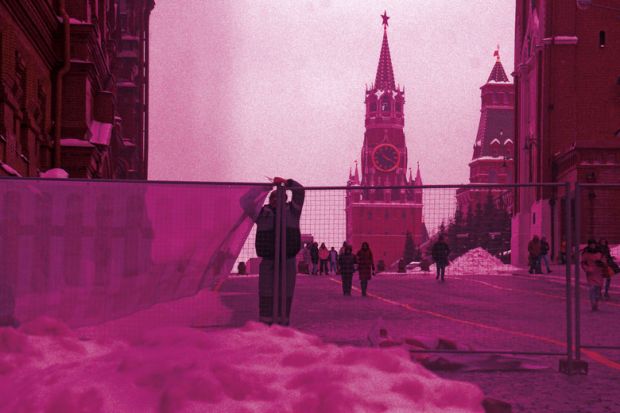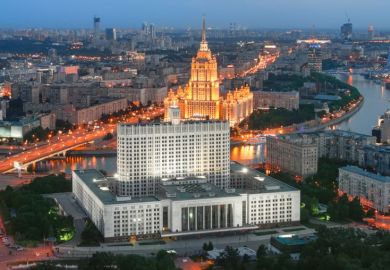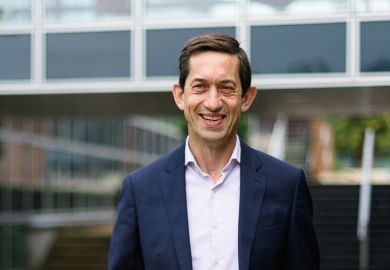All humanity’s thoughts are with Ukraine, and all possible support goes to its brave people. It cannot be otherwise while children, women, and young and elderly people are being killed by Russian bombs and guns.
Yet postponing thinking about the post-war future cannot be left until the direct violence stops. Russia will not disappear from the map; there will remain around 144 million Russians living next door to Europe. It is not in the West’s interests to abandon them wholesale.
Loud voices are calling on Western countries to enact a complete boycott of Russia, including of its scientists, academics and universities. As Western-based academics of Russian extraction, we agree that the consequences of Russian aggression cannot be mild and that those who directly and clearly supported the war must be banned from all international interaction. We also agree that state-controlled Russian higher education and research institutions (HERIs) should be considered inseparable from the Russian government; many explicitly back military aggression against Ukraine, either through direct appeals from their administrations or via decisions made by their academic councils. Sanctions against them are logical and even necessary.
However, there are a number of non-state HERIs that do not support the war and/or are persecuted by the Russian authorities as alleged “foreign agents”. Ceasing cooperation with them will only add to the punishment that the Kremlin is inflicting.
Moreover, the West has contributed to the education of many progressively minded Russians. Many of them are academics, and they remain friends of humanity and peace, promoting – openly or behind the scenes – the anti-military agenda. Refusing to interact with them is a betrayal.
It should be clearly stated that having an open anti-war stance in modern Russia is close to heroism given the risk of being fired from jobs, expelled from studies and even imprisoned. True, Russian academics do not face the dangers that Ukrainian colleagues currently do, but there is a strong hope that Ukrainians will eventually be able to return to their homes and academic lives. Russian academicians who oppose Putin have a hard choice between vegetating – psychologically and professionally – in Russia or fleeing the country for a long time, if not forever.
We urge the international community not to boycott research in collaboration with Russian scientists. Projects whose results were obtained before the beginning of the invasion should be published as normal. For papers submitted after that date – 24 February – no affiliation should be published for academics at state-controlled Russian HERIs.
The same policy should apply to Russia’s participation on editorial boards, research councils and other collective bodies. Russian academicians with clear anti-war positions should be able to continue participating as individual, non-institutional members.
Nor should Western HERIs ban new or ongoing collaborations with Russian colleagues (as many are doing, at least temporarily). Clearly, research in areas related to national or public security cannot proceed. But there are fields where collaboration brings greater benefit than harm, such as climate research and public health. Moreover, co-funded research will divert financial resources that could otherwise be used to support the Russian military machine.
We do consider it expedient, as far as it is possible, to limit the access of Russian official structures and HERIs to academic databases that can be used for research and development in sensitive areas. But we oppose limiting access to databases of humanitarian and social knowledge. Here, one can draw parallels with the late USSR, when the few Soviet scientists who had access to Western social science not only fed on the ideas but also conveyed them to a wider audience (albeit in a critical context). The Kremlin wants to replace international knowledge with a pseudo-scientific propaganda machine. This will deprive the next generation of Russians of a decent education and critical-thinking skills; the West should not aid this endeavour.
For similar reasons, Western HERIs should not turn their backs on Russian students. Those seeking an education abroad are often fleeing ideological pressure and even direct threats to their freedom and safety. Those expelled from Russian universities for anti-war protests are potentially the core of Russia’s post-war, post-Putin leadership.
Indeed, the West should do all it can to devise mechanisms to support Russian students who want to continue their studies abroad. Sanctions on Russian financial institutions are making it difficult for Russian exchange students to receive money from home. This will force them to return to Russia and continue at universities whose leadership, and often ordinary teachers, supports military aggression.
The same goes for Russian academics. Many of our colleagues who openly opposed Putin’s war in Ukraine have been fired or forced to leave their universities. They need our support. Unfortunately, there are cases – albeit isolated – of Russians being quietly squeezed out of Western universities.
We also call the global academic community to support the self-organisation of Russian scientists and teachers to offer – via initiatives such as the Free University and the University of New Europe – Russian-language teaching to exiled students from Russia, Ukraine and Belarus. The possibility should be considered of establishing a bricks-and-mortar campus in a European country for Russian teachers and students in exile. This will further promote the protection and development of human capital for post-Putin Russia.
We remind you that the harm caused by military violence goes far beyond infrastructure and even human losses. Calls for discrimination against any social group is the way to continue structural and cultural violence on a global scale.
Once again: we do not question the tragedy of Ukraine. But we emphasise that the future of the progressive part of Russian civil society and academia depends in large measure on whether it can survive abroad.
Dmitry Dubrovsky is a fellow at the Central and East European Law Initiative, Prague, and professor at the Free University (Briva Universitate). Gleb Yarovoy is a researcher at the University of Eastern Finland. They have donated their honorariums to the Council for At-Risk Academics (CARA).
Register to continue
Why register?
- Registration is free and only takes a moment
- Once registered, you can read 3 articles a month
- Sign up for our newsletter
Subscribe
Or subscribe for unlimited access to:
- Unlimited access to news, views, insights & reviews
- Digital editions
- Digital access to THE’s university and college rankings analysis
Already registered or a current subscriber? Login








